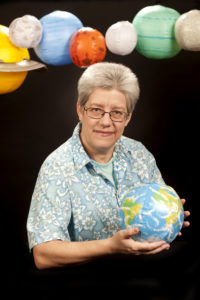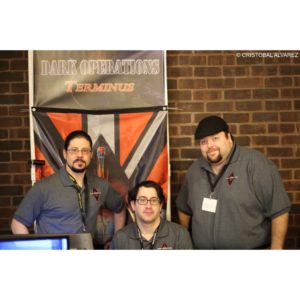Astronomy education – Dr. Inge Heyer interview
Podcast: Play in new window | Download
Subscribe: Apple Podcasts | RSS
 Dr. Inge Heyer has been involved with astronomy for over 30 years as a researcher and educator. She spoke to me at Far Point 2018 about what it takes to teach astronomy. (Photo provided by Dr. Heyer)
Dr. Inge Heyer has been involved with astronomy for over 30 years as a researcher and educator. She spoke to me at Far Point 2018 about what it takes to teach astronomy. (Photo provided by Dr. Heyer)
1:24 – Dr. Heyer highlights the importance of imagination in explaining concepts to students.
3:04 – Her favorite part of teaching astronomy is when people get their hands on models or something they can really see to learn better. There are always new tools to teach with.
7:09 – She has a rule of no tech in her class. Students put their phones in a class box for extra credit. It means they’re interacting more with students when they do it. Participation in class has increased using this method.
8:24 – Star Trek was her big science fiction inspiration. She also read German sci-fi. Hans Dominik is one. Karl May was another inspiration but he wrote about traveling around the world.
12:53 – She felt like she was certainly an astronomer in college when she started collecting actual data in an observatory.
13:54- Astronomy can teach us about life on Earth. People are made from the stuff that stars are made from.
15:54 – She also likes Babylon 5, Stargate, NCIS and other non science fiction type entertainment.
17:54 – She’s worked on Hubble and also with the British Observatory.
20:16 – Dr. Hyer discusses what astronomy is like in various countries around the world. Countries get together to build observations together and establish consortiums.
22:09 – There are also science fiction fans everywhere.
23:59 – She appreciates that science fiction isn’t supposed to teach people. However, she doesn’t like when they get current science wrong.
27:31 – Science fiction fans are natural communicators. They all talk to each other about the information they learn.
29:24 – She ran an experiment to see the connection between science fiction interest and science interest. She found a third factor between them. Both groups are early literates. Everyone in the group she talked to was reading by age six and many were writing stories by age eight.
31:43 – People can go to www.ingeheyer.com for more information. People should also attend Shore Leave in July 6-8. The convention site is http://www.shore-leave.com/
Links
https://en.wikipedia.org/wiki/Hans_Dominik_(writer)
https://en.wikipedia.org/wiki/Karl_May
https://en.wikipedia.org/wiki/Hubble_Space_Telescope
For more “Creating Sci-Fi and Fantasy – An Inside Look” please follow me on Facebook at crisalvarezwlc, on youtube at Cris Alvarez and on Instagram @crisalvarezscifi
Guests: Dr. Inge Heyer
Host: Cris Alvarez
Tags: science fiction, sci-fi, star trek, shore leave, travel, astronomy, telescopes, education, science
